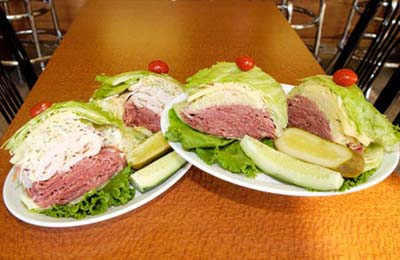Powerhouses like Kroger Co., 7-Eleven Inc., Wal-Mart Stores Inc. and others are throwing their weight behind low-carb products, hoping to boost their bottom lines while shrinking those of their shoppers.
Restaurants like the Vineyards Cafe in Farmington Hills are drawing crowds for their low-carb sandwiches. They are ideal because the sandwich is wrapped in lettuce instead of bread, said Vineyards owner Ron Asmar.

“It’s so filling it’s unbelievable,” said Asmar, a former yo-yo dieter who has been on a no-carbs regimen for five years.
Consider this: Sales at New York-based Atkins Nutritionals Inc., which sells Atkins products and information, are expected to double this year from $100 million in 2002.
The privately held company estimates 25 million people are on the Atkins diet, named after the late Dr. Robert C. Atkins, whose first low-carb missive was published 30 years ago.
For retailers, low-carb has made the transition from a fad or trend. It’s now a lifestyle, and consumer surveys show it is likely to influence shopper behavior for years.
In his 1972 book, “Dr. Atkins’ Diet Revolution,” the controversial doctor recommended a diet where up to two-thirds of calories come from fat, more than double the traditional recommendation.
Since then, the diet’s popularity has grown. Its real sizzle came in the past few months following new studies that show these diets can be safe and effective.
Heinz’s new One Carb Ketchup “is designed for consumers who wish to moderate their carbohydrate intake without having to compromise on taste,” the company said.
The low-carb market is so new that relatively little data exists to show the growing popularity of these diets, said Marketdata Research Director John LaRosa.
Retailers noticed the shift in consumer habits and began to respond. Atkins-branded food and supplement products are now available in more than 30,000 stores nationwide.
Source